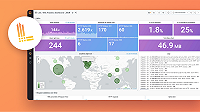Caution
Grafana Agent has reached End-of-Life (EOL) on November 1, 2025. Agent is no longer receiving vendor support and will no longer receive security or bug fixes. Current users of Agent Static mode, Agent Flow mode, and Agent Operator should proceed with migrating to Grafana Alloy. If you have already migrated to Alloy, no further action is required. Read more about why we recommend migrating to Grafana Alloy.
Important: This documentation is about an older version. It's relevant only to the release noted, many of the features and functions have been updated or replaced. Please view the current version.
Install the Operator
In this guide, you’ll learn how to deploy Grafana Agent Operator into your Kubernetes cluster. This guide does not use Helm. To learn how to deploy Agent Operator using the grafana-agent-operator Helm chart, see Install Grafana Agent Operator with Helm.
Note: If you are shipping your data to Grafana Cloud, use Kubernetes Monitoring to set up Agent Operator. Kubernetes Monitoring provides a simplified approach and preconfigured dashboards and alerts.
Before you begin
To deploy Agent Operator, make sure that you have the following:
- A Kubernetes cluster
- The
kubectlcommand-line client installed and configured on your machine
Note: Agent Operator is currently in beta and its custom resources are subject to change.
Deploy the Agent Operator Custom Resource Definitions (CRDs)
Before you can create the custom resources for a Grafana Agent deployment, you need to deploy the Custom Resource Definitions to the cluster. These definitions describe the schema that the custom resources will conform to. This is also required for Grafana Agent Operator to run; it will fail if it can’t find the Custom Resource Definitions of objects it is looking to use. To learn more about the custom resources Agent Operator provides and their hierarchy, see Grafana Agent Operator architecture.
You can find the set of Custom Resource Definitions for Grafana Agent Operator in the Grafana Agent repository under
operations/agent-static-operator/crds.
To deploy the CRDs:
Clone the agent repo and then apply the CRDs from the root of the agent repository:
kubectl apply -f production/operator/crdsThis step must be completed before installing Agent Operator—it will fail to start if the CRDs do not exist.
To check that the CRDs are deployed to your Kubernetes cluster and to access documentation for each resource, use
kubectl explain <resource>.For example,
kubectl explain GrafanaAgentdescribes the GrafanaAgent CRD, andkubectl explain GrafanaAgent.specgives you information on its spec field.
Install Grafana Agent Operator
Next, install Agent Operator by applying the Agent Operator deployment schema.
To install Agent Operator:
Copy the following deployment schema to a file, updating the namespace if needed:
apiVersion: apps/v1 kind: Deployment metadata: name: grafana-agent-operator namespace: default labels: app: grafana-agent-operator spec: replicas: 1 selector: matchLabels: app: grafana-agent-operator template: metadata: labels: app: grafana-agent-operator spec: serviceAccountName: grafana-agent-operator containers: - name: operator image: grafana/agent-operator:v0.41.1 args: - --kubelet-service=default/kubelet --- apiVersion: v1 kind: ServiceAccount metadata: name: grafana-agent-operator namespace: default --- apiVersion: rbac.authorization.k8s.io/v1 kind: ClusterRole metadata: name: grafana-agent-operator rules: - apiGroups: [monitoring.grafana.com] resources: - grafanaagents - metricsinstances - logsinstances - podlogs - integrations verbs: [get, list, watch] - apiGroups: [monitoring.coreos.com] resources: - podmonitors - probes - servicemonitors verbs: [get, list, watch] - apiGroups: [""] resources: - namespaces - nodes verbs: [get, list, watch] - apiGroups: [""] resources: - secrets - services - configmaps - endpoints verbs: [get, list, watch, create, update, patch, delete] - apiGroups: ["apps"] resources: - statefulsets - daemonsets - deployments verbs: [get, list, watch, create, update, patch, delete] --- apiVersion: rbac.authorization.k8s.io/v1 kind: ClusterRoleBinding metadata: name: grafana-agent-operator roleRef: apiGroup: rbac.authorization.k8s.io kind: ClusterRole name: grafana-agent-operator subjects: - kind: ServiceAccount name: grafana-agent-operator namespace: defaultRoll out the deployment in your cluster using
kubectl apply -ffollowed by your deployment filename.
Note: If you want to run Agent Operator locally, make sure your kubectl context is correct. Running locally uses your current kubectl context. If it is set to your production environment, you could accidentally deploy a new Grafana Agent to production. Install CRDs on the cluster prior to running locally. Afterwards, you can run Agent Operator using
go run ./cmd/grafana-agent-operator.
Deploy the Grafana Agent Operator resources
Agent Operator is now up and running. Next, you need to install a Grafana Agent for Agent Operator to run for you. To do so, follow the instructions in the Deploy the Grafana Agent Operator resources topic.



